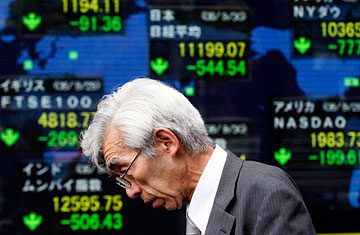
Japan's Nikkei stock average fell nearly 5 percent after U.S. lawmakers rejected a $700 billion financial bailout plan
Investors and money managers in Asia were relieved yesterday after the 7% plunge in the Dow Jones Industrial Average, which marked the largest one-day points drop in Wall Street history, did not ignite a calamitous selloff on Asian markets. There was some damage after Washington failed to pass a $700 billion bailout plan for the U.S. financial system, the catalyst for Wall Street's plunge. Japan's Nikkei Index fell 4.1% on Sept. 30; after declining in early trading, stocks in China and Hong Kong eked out small gains. "The reaction was not as bad as I had feared," says Dariusz Kowalcyzk, chief investment strategist of CFC Seymour, a boutique investment bank in Hong Kong.
Then again, it's hard to feel like you've dodged a bullet when you are already riddled with holes. Asian stocks have absorbed severe losses this year — The MSCI Asia-Pacific Index is down nearly 30% in 2008, while China's Shanghai market is down 60% from it's January high (The Dow is down 20% this year). Asian shares already took a hit after the rescue package failed to pass over the weekend, with shares in Hong Kong and Tokyo plunging by 5.5% and 5% respectively on Sept. 29. "It's pretty terrible already," Kowalcyzk says.
No one is willing to predict when a bottom might be reached. Even if the U.S. Congress passes a bailout, that could be just the beginning of what looks to be a long and painful economic unwinding for Asia. That's because exports to the U.S. are crucial for economic growth in many Asian countries. A bailout "does not address the decimation of the wealth effect of the U.S. consumer," says Kirby Daley, senior strategist at Newedge Group, a financial services firm based in Hong Kong. Nor can a bailout replace all the liquidity that has evaporated from global financial markets, which made it cheaper for companies to borrow money to build new factories, buy new equipment or expand into new territories. "We will never return to those levels of liquidity," Daley says.
Indeed, falling U.S. consumer spending and the drying up of credit create big problems for Asian companies that may not be reflected in their current stock prices. "We have not yet seen the impact in the corporate sector yet," says Irene Cheung, a corporate director in ABN Amro's Asian markets trading business in Singapore. "That's the scary part." Cheung expects a further decline of 20% to 30% in Asian equity markets.
Not everyone is so bearish. Kowalcyzk predicts a further decline this year of 5%. The only thing that seems certain is ongoing volatility as expectations of a U.S. recession continue to mount. Americans may get the worst of it, but Asians will certainly feel their pain.
